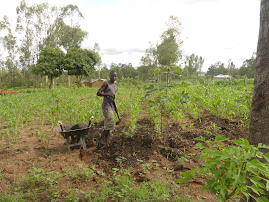 |
| Bye bye comfort zone |
There’s so
much I’ve learned. "Learned" is actually an exaggerated term; let’s
say I understood that there are some ways of reasoning, outside of mine, that I
would like to absorb and put into practice.
I thought of three simple, closely related concepts, which can help me summarize this first part of experience:
1. TIME
BRINGS PATIENCE
The way life is approached has nothing to do with the reality I am used to. As well as time, which flows and is used differently.
 |
| Waiting for members |
And in the meantime, time goes by.
Sometimes my attention gets completely captured by these people. And I think the frenzy is something completely unknown to them. In Kenya you live "pole pole". If you have a meeting scheduled for 10, for sure it won't start before 11.
If I try
for a moment to hazard a comparison with my country of origin, a smile escapes
me: in Italy, I don’t have time to enter a bar to order "One co..
ffè" that the bartender has already prepared and served it to me.; if, on
the other hand, I go to the post office, I see people losing their temper after
a minute of waiting.
And in the meantime, time goes by. Without being savoured.
 |
| Wooden board seat |
 |
| The more we are, the better is |
I mean, wherever you have to go, you’ll get there!
3. EVERY PROBLEM IS NOT A PROBLEM
As can be
understood in part from the previous lines, in Kenya there is a solution to
everything.
Or rather,
there is nothing that can be considered a real problem. I want to specify that
since my arrival I have not yet had to reckon with the lack of water, will be
luck or perhaps due to the rainy season, which allows you to accumulate
everything that the sky has to offer in large containers located outside the
houses (tank); Instead, it happened to me that I had to cope with a
blackout, but since I don't have a fridge, or even a freezer, I'm certainly not
afraid that my food will thaw!
Torch to the head and
face the evening. And considering that the sun sets early, it gets dark early.
Uh..and if to go and visit the people of the village, you find yourself walking with flip-flops in the middle of the storm, do not break down. Maybe you come home with a delicious papaya just picked up and a piece of bed found by chance with which to build the shelf that you so desired.
 |
| The sun in the rain |
 |
| The light in the dark |





